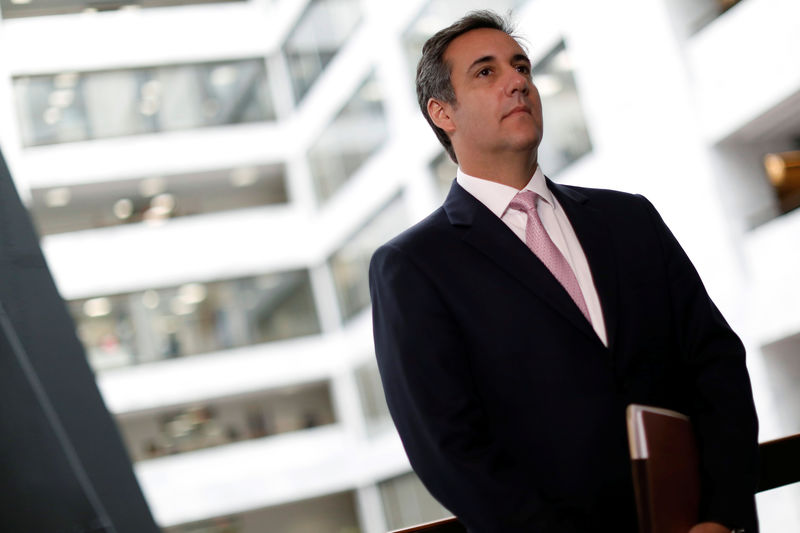By Warren Strobel and Patricia Zengerle
WASHINGTON (Reuters) - A U.S. Senate panel probing alleged Russian interference in the 2016 election abruptly canceled an interview with President Donald Trump's lawyer Michael Cohen on Tuesday after he issued a statement about his testimony in violation of committee policy.
"The committee expects witnesses in this investigation to work in good faith with the Senate,” Senate Intelligence Committee Chairman Richard Burr and Vice Chairman Mark Warner said in a statement after canceling the closed-door session. Cohen was later asked to appear at an open hearing on Oct. 25.
Burr, a Republican, and Warner, a Democrat, said it was against the committee's policy for witnesses to make public comments before being interviewed.
The intelligence panel, other congressional committees and special counsel Robert Mueller are investigating whether Russia intervened to tilt the 2016 election in Trump's favor and whether Trump or top aides colluded with Moscow.
The Russian government denies any attempt to influence the election, and the Republican president has repeatedly denied any collusion, calling the investigations a "witch hunt."
The allegations have shadowed the first months of Trump's presidency.
Two people familiar with the matter told Reuters that Trump was using money donated to his re-election campaign and the Republican National Committee to pay for his lawyers in the probe.
While previous presidential campaigns have used those funds to pay routine legal fees, Trump would be the first U.S. president in the modern campaign finance era to use them to cover the costs of responding to a criminal probe, election law experts said.
DENYING COLLUSION
In his statement, Cohen denied that he or Trump colluded with Russia to interfere in the election, and said such charges were made to discredit Trump's presidency.
"I emphatically state that I had nothing to do with any Russian involvement in our electoral process," Cohen's statement said. "Given my own proximity to the president of the United States as a candidate, let me also say that I never saw anything - not a hint of anything - that demonstrated his involvement in Russian interference in our election or any form of Russia collusion," Cohen said.
Cohen and his attorney, Stephen Ryan, had traveled to Capitol Hill for the closed-door interview with committee investigators, but were told the meeting had been postponed.
"We didn't want to send a message except for what we do is behind closed doors," Burr later told reporters at the Capitol.
The committee had changed its policy since Trump's son-in-law and close adviser, Jared Kushner, issued an 11-page statement before meeting with intelligence committee staff in July, he said.
Asked if the committee would subpoena Cohen, Burr said he did not think it would need to.
Cohen's name surfaced in a dossier compiled by former British intelligence officer Christopher Steele that reported Cohen played an important role in liaison with the Russian government and secretly met with Kremlin officials in Prague in August 2016.
The Steele dossier, Cohen said in his statement, was "riddled with falsehoods and intentionally salacious allegations."
"I have never in my life been to Prague or to anywhere in the Czech Republic," he said.
Current and former U.S. intelligence officials have said that while they cannot verify all the details in the Steele dossier, neither have they debunked it entirely.
Former Utah Governor Jon Huntsman, Trump's nominee to be ambassador to Russia, said at his Senate confirmation hearing on Tuesday: "There is no question, underline no question, that the Russian government interfered in the U.S. election last year."
He pledged to bring up the issue with the government there.

Huntsman previously served as U.S. ambassador to China under Democratic President Barack Obama.